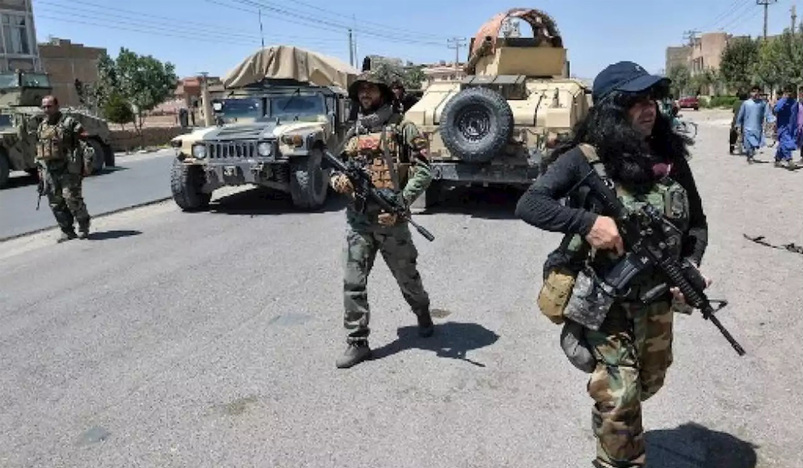
The Taliban seized two more Afghan provincial capitals Tuesday
AFP
The Taliban seized two more Afghan provincial capitals Tuesday -- including one just 200 kilometres (125 miles) from Kabul -- as tens of thousands of people fled their homes in the north for the relative safety of Kabul and other centres.
Farah city, capital of the same-named province, and Pul-e-Khumri in Baghlan fell within hours of each other, officials in both centres told AFP.
The Taliban confirmed their seizure in separate tweets.
"The Taliban are now in the city," Baghlan MP Mamoor Ahmadzai told AFP.
"They have raised their flag in the main square and on governor's office building."
Six of the other provincial capitals to have fallen since Friday are in the country's north with the insurgents setting their sights on Mazar-i-Sharif, the region's biggest city.
Its fall would signal the total collapse of government control in the traditionally anti-Taliban north.
Government forces are also battling the hardline Islamists in Kandahar and Helmand, the southern Pashto-speaking provinces from where the Taliban draw their strength.
The United States -- due to complete a troop withdrawal at the end of the month and end its longest war -- has all but left the battlefield.
However, Washington's special envoy Zalmay Khalilzad is now in Qatar to try and convince the Taliban to accept a ceasefire.
Envoys from hosts Qatar, Britain, China, Pakistan, Uzbekistan, the United Nations, and European Union were also due to discuss the situation in Afghanistan, a source told AFP.
But even with a new round of talks in the works, Pentagon spokesman John Kirby said it was down to the Afghan government and its forces to turn the tide, and there was "not much" the United States could do to help.
The Taliban have appeared largely indifferent to peace overtures, and seem intent on a military victory to crown a return to power after their ouster 20 years ago in the wake of the September 11 attacks.
As fighting raged, thousands of people were on the move inside the country, with families fleeing newly captured Taliban cities with tales of brutal treatment at the hands of the insurgents.
"The Taliban are beating and looting," said Rahima, now camped out with hundreds of families at a park in the capital, Kabul, after fleeing Sheberghan province.
"If there is a young girl or a widow in a family, they forcibly take them. We fled to protect our honour."
The UN's International Organization for Migration said Tuesday that more than 359,000 people have been displaced by fighting this year alone.
In the northern city of Kunduz that was captured by the Taliban over the weekend, residents said shops had begun to reopen in the centre as the insurgents focused their attention on government forces who had retreated to the airport.
"People are opening their shops and businesses, but you can still see fear in their eyes," said shopkeeper Habibullah.
Another resident, living close to the airport, reported days of heavy fighting.
"The Taliban are hiding in people's houses in the area and government forces are bombing them," said Haseeb, who only gave his first name.
The Taliban earned notoriety during their first stint in power from 1996-2001 for introducing a harsh interpretation of Islamic rule that barred girls from education and women from work.
Crimes were punished by public floggings or executions, while a host of activities -- from playing music to non-religious TV -- were also banned.
On Tuesday, the Taliban reiterated they were closing in on Mazar-i-Sharif -- a linchpin for the government's control of the north -- after capturing Sheberghan to its west, and Kunduz and Taloqan to its east.
But Fawad Aman, spokesman for the ministry of defence, said Afghan forces had the upper hand there.
From Geneva, the UN warned the war was unleashing another humanitarian crisis.
"Unless all parties return to the negotiating table and reach a peaceful settlement, the already atrocious situation for so many Afghans will become much worse," said UN High Commissioner for Human Rights Michelle Bachelet.
.jpg)
Qatar Secures Place Among the World's Top 10 Wealthiest Nations
.jpg)
Hamad International Airport Witnesses Record Increase in Passenger Traffic

Saudi Arabia: Any visa holder can now perform Umrah

What are Qatar's Labour Laws on Annual Leave?
Leave a comment